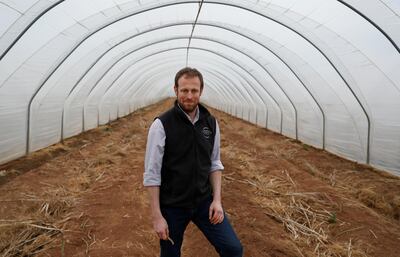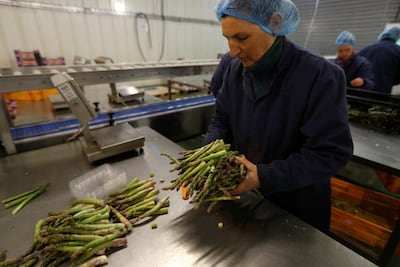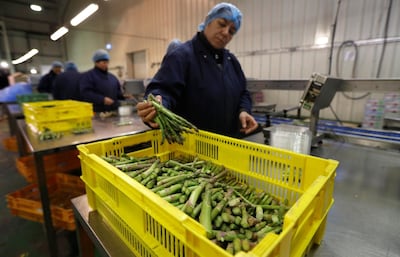For almost 100 years, Chris Chinn's family has farmed asparagus in the rolling hills of the Wye Valley in western England.
This year, he fears uncertainty around Britain's departure from the European Union will keep his eastern European workers away and the asparagus will stay in the ground.
Asparagus grown in Britain is feted by chefs as among the world's best but the seasonal worker shortage threatens the country's asparagus industry and the viability of Mr Chinn's Cobrey Farms business.
It is a predicament shared by many British fruit and vegetable farmers, almost totally reliant on seasonal migrant workers from EU member states Romania and Bulgaria taking short-term jobs that British workers do not want.
At Mr Chinn's farm, which turns over more than £10 million (Dh48.58m) a year, the workers pick by hand the premium asparagus spears that can grow up to 20cm a day. Sometimes they pick them twice a day before dispatching them to customers such as Marks and Spencer and Britain's biggest supermarket, Tesco.
"It is incredibly clear cut - there is no UK asparagus on your supermarket shelves without seasonal migrant workers," said Mr Chinn.
"We're really at the point where we either import the workers or we import the asparagus."
Britain's asparagus season is short and early - traditionally running from April 23, known as Saint George's Day, to Midsummer's Day in mid-June. It will be the first big test of the 2019 seasonal labour crisis.
This year Mr Chinn's team has had to work much harder to recruit Romanians and Bulgarians who are perplexed by the long Brexit process as Prime Minister Theresa May seeks parliament's approval for a divorce deal with the EU. They are also wary of the welcome they will receive from Britons, who voted in 2016 to leave the EU.
Although Cobrey Farms has signed up 1,200 workers who are due to start arriving at the end of this month, Mr Chinn fears many will not turn up. He does not think he will be able to harvest the entire crop, meaning valuable asparagus will be left in the fields.
"If we're 20 per cent short of people then we will harvest 20 per cent less asparagus," said Mr Chinn. "UK agriculture's not a high-margin game, so 20 per cent less means we're in loss-making territory. Fifty per cent could sink us."
Mr Chinn's concern grew after 20 of the 100 or so workers due to help cultivate the crops in January failed to turn up.
Of 247 workers due to arrive between March 31 and April 6, 125 are yet to book flights, he said. They include 38 who have worked at Cobrey Farms before and stayed in the dozens of static caravans that stand at the foot of the hills on the farm.
Mr Chinn, who voted Remain in the 2016 Brexit referendum, said uncertainty over eastern Europeans' employment rights and how long they can stay, combined with a fall in the value of the pound, meant Germany and the Netherlands were now considered more attractive destinations.
"They go somewhere which is most straightforward and any, even minor, hurdles you put in their way is just nudging them ever closer to going somewhere else," he said.
With just 11 days to go until Britain is due to leave the EU, the government is yet to agree a withdrawal arrangement or an extension, meaning the risk of a disorderly "no-deal" Brexit cannot be ruled out.
When EU heads of government meet in Brussels on Thursday, Mrs May will use the summit to request an extension to the two-year Brexit negotiating period that is due to end on March 29.
The outcome of these talks will be determined by whether or not parliament has approved Mrs May’s deal, and what conditions the EU attaches to a delay. Any delay requires agreement of all other 27 EU members.
If Mrs May’s deal is rejected again, ministers have warned that the EU is only likely to agree to a longer delay, and that an alternative approach to Brexit would need to be found.
If Britain agrees on a divorce deal, a transition period will kick in, maintaining freedom of movement until the end of 2020. In the event of no deal, EU citizens arriving after March 29 would need to register to work for more than three months.
Elina Kostadinova, a 28 year-old harvest manager at Cobrey Farms who is from Varna on Bulgaria's Black Sea, said many workers were worried about coming to Britain because of Brexit.
"They don't know if they will be welcomed in the country, how long they may be able to stay, how they may be able to travel and what the future may hold," she said. "It would be wonderful if the UK government could make a decision, so we can relay this message."
British farms typically pay workers the national minimum wage of £7.83 an hour plus performance-related bonuses.
Mr Chinn said the idea of British workers plugging the gap was fanciful. He does not expect much help from the supermarkets, where sales volumes have already been negotiated for the season and prices have been fixed, barring exceptional circumstances.
Britain's fruit and vegetable sector relies on up to 80,000 seasonal workers from the EU each year. Having previously been inundated with applications, labour agencies say interest dropped off in 2017 and 2018 as workers from Romania and Bulgaria opted to go elsewhere in the EU.
For the past two seasons, Britain has been short by around 10,000 workers, threatening the food supply and forcing farms to pay higher wages and bonuses. At the end of the summer as workers want to leave, farms will offer free accommodation and to pay the cost of flights to try to persuade them to stay on.
Concordia, a labour agency charity that finds EU pickers for British farms, said it now has to work much harder to recruit.
"UK agriculture is definitely entering into a crisis. No labour means no harvesting, which means no fruit and no vegetables on shelves in British supermarkets," said chief executive Stephanie Maurel.
She was speaking in Moscow after the British government sanctioned a pilot trial for 2,500 workers to enter the country from Russia, Ukraine and Moldova for up to six months over the next two years.
Mr Chinn, who has 3,500 acres of land, wants the government to increase the numbers to 10,000 this summer and over 50,000 in the next couple of years.
"We can't change this natural cycle of the crop ... the crop will come out the ground when it warms up," he said.
"So the key is about not waiting for a total disaster that wipes out large swathes of UK horticulture."




